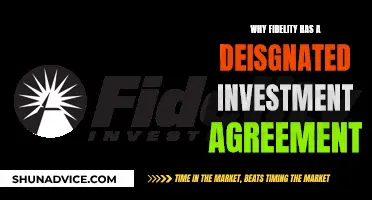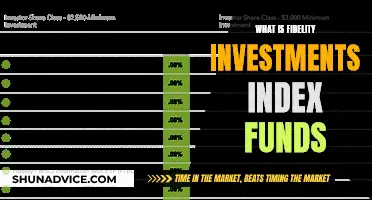
Money market funds are a type of mutual fund that invests in highly-rated, short-term debt securities. They are considered a safe, stable, and conservative investment option for money that may be needed in the short term. Money market funds are different from money market accounts, which are interest-bearing bank accounts. Money market funds are not insured by the Federal Deposit Insurance Corporation (FDIC) but are instead protected by the Securities Investor Protection Corporation (SIPC). They are intended to offer investors high liquidity with a very low level of risk and are used by investors who want to diversify their portfolio and earn interest on their savings.
| Characteristics | Values |
|---|---|
| Type of Mutual Fund | Money market funds are a type of mutual fund |
| Investment Type | Money market funds invest in highly-liquid, short-term, low-risk debt securities |
| Returns | Money market funds have low returns compared to other mutual funds |
| Risk | Money market funds are considered low-risk |
| Liquidity | Money market funds are highly liquid |
| Volatility | Money market funds are among the lowest-volatility types of investments |
| Tax | Income generated by a money market fund is either taxable or tax-exempt |
| Insurance | Money market funds are not insured by the FDIC but are covered by the SIPC |
What You'll Learn

Money market funds are a type of mutual fund
Money market funds are designed to offer investors high liquidity with a very low level of risk. They invest in low-risk, short-term debt instruments such as Treasury bills, municipal debt, corporate bonds, and cash equivalents. The funds have a fixed price of $1 per share and aim to maintain a net asset value (NAV) of $1 per share. This means that your account value remains stable, with any changes reflecting the growth from your earnings.
Money market funds are a conservative investment option, making them suitable for those with a low tolerance for volatility or those seeking to diversify their portfolio with a more conservative investment. They are also commonly used for short-term goals, such as emergency funds, upcoming purchases, or spending funds.
It is important to note that money market funds are not the same as money market accounts. While both offer low-risk ways to save money, money market accounts are typically offered by banks and are insured by the FDIC. In contrast, money market funds are an investment product that requires a brokerage account and do not have FDIC insurance.
Tata Digital India Fund: A Smart Investment Strategy
You may want to see also

They invest in low-risk, short-term debt securities
Money market funds are a type of mutual fund that invests in low-risk, short-term debt securities. These funds are designed to offer a safe and stable investment option for money that may be needed in the short term, such as an emergency fund or savings for a short-term goal. They are also used as settlement funds in brokerage accounts. Money market funds are considered extremely low-risk and are intended to provide high liquidity with very low levels of risk.
Money market funds invest in a variety of short-term debt securities, including:
- Treasury bills: Short-term government debt securities that mature in less than a year.
- Municipal debt: Debt securities issued by municipalities, such as municipal bonds.
- Corporate bonds: Debt securities issued by corporations, typically with maturities of less than a year.
- Bankers' Acceptances (BA): Short-term debt guaranteed by a commercial bank.
- Certificates of Deposit (CDs): Bank-issued savings certificates with short-term maturities.
- Commercial paper: Unsecured short-term corporate debt.
- Repurchase agreements (Repo): Agreements to buy and sell securities, often used for short-term government securities.
These investments are highly liquid and have short maturity periods, usually less than a year, with most maturing in three months or less. The short maturity of these investments ensures that investors' money is not locked into long-term instruments, maintaining the liquidity of the fund.
Money market funds aim to maintain a stable Net Asset Value (NAV) of $1 per share. Any excess earnings are distributed to investors as dividend payments. This $1 NAV is a key factor in the popularity of money market funds, as it provides regular income and easy tracking of net gains. While money market funds have dipped below this value ("broken the buck") on rare occasions, they have quickly bounced back.
Overall, money market funds offer a safe and stable investment option for those seeking low-risk, short-term investments.
A Guide to Investing Money in Pag-Ibig Fund
You may want to see also

Money market funds are not the same as money market accounts
Accessibility
Money market funds must be bought and sold like any other mutual fund, so they may not provide as much daily access to your money as a money market account. With a money market account, you can withdraw your cash at any time, and you may be given an ATM card to access your money whenever you like, including weekends and holidays. You may also be able to write checks, which is not possible with a money market fund.
Taxation
You will almost always pay taxes on returns from both money market accounts and money market funds. However, you may be able to avoid federal taxes by investing in a municipal money market mutual fund, and you might avoid state taxes by investing in a fund for your state of residence.
Fees
Money market accounts could charge maintenance fees if your account drops below a specified amount. Money market funds, on the other hand, typically charge an expense ratio, which is a percentage-based amount for management fees. This rate can range from about 0.08% to 0.40%.
Risk
Money market accounts are insured by the Federal Deposit Insurance Corporation (FDIC) or the National Credit Union Administration (NCUA). Money market funds are insured by the Securities Investor Protection Corporation (SIPC). While money market funds are relatively safe investments, they are not insured by the FDIC or NCUA, and they carry more risk.
Returns
Money market funds generally earn higher returns than money market accounts. However, money market accounts offer easier access to your money and don't require an investment account.
A Guide to Investing in US Index Funds from Australia
You may want to see also

Money market funds are not insured by the FDIC
Money market funds are a type of mutual fund that invests in low-risk, short-term debt securities, such as Treasury bills, municipal debt, or corporate bonds. They are designed to offer a safe and stable investment option for money that may be needed in the short term.
Money market funds are not insured by the Federal Deposit Insurance Corporation (FDIC). This is because they are not bank accounts or deposits but rather investment products. The FDIC only insures bank deposits and not investments.
Money market funds are also different from money market accounts, which are typically offered by banks and credit unions as deposit accounts. Money market accounts are insured by the FDIC, while money market funds require a brokerage account to get started.
While money market funds are not insured by the FDIC, they may be eligible for $500,000 in coverage under the Securities Investor Protection Corporation (SIPC) when held in a brokerage account. The SIPC protects investors if their brokerage fails, but it does not insure the value of the investment.
It is important to understand that money market funds are not guaranteed or insured by the U.S. government or any government agency. They are subject to market risk and it is possible to lose money by investing in these funds.
The lack of FDIC insurance on money market funds highlights the difference between deposit accounts and investment products. Deposit accounts, such as savings and checking accounts, are typically insured by the FDIC up to a certain limit, while investment products like money market funds are not.
Therefore, it is crucial for investors to understand the risks associated with money market funds and that their principal investment is not guaranteed or insured by the FDIC or any government agency.
Low-Cost Index Funds: When to Steer Clear
You may want to see also

They are suitable for short-term investment goals
Money market funds are suitable for short-term investment goals. They are a type of mutual fund that invests in highly liquid, low-risk, short-term debt securities. These funds are designed to offer a safe, stable investment option for money that may be needed in the short term.
Money market funds are a good option for those with a low tolerance for volatility, or those looking to diversify with a more conservative investment. They are also suitable for those who need their investment to be extremely liquid.
Money market funds are typically used to hold money that will be needed soon, such as for an upcoming purchase or emergency fund, or money that is being saved for a short-term goal, such as a wedding or a down payment on a home. They can also be used as settlement funds in brokerage accounts.
While money market funds have lower returns than other types of fixed-income funds, they offer stability and can play an important role in an investor's portfolio by offsetting the volatility of bond and equity investments. They are also a good option for those who are close to or in retirement and need access to their money soon.
Money market funds are considered low-risk because they invest in low-risk, short-term debt instruments such as government-backed securities, Treasury bills, municipal debt, corporate bonds, and certificates of deposit (CDs). They aim to maintain a stable $1 net asset value (NAV) per share, and investors can generally withdraw their money at any time without penalties.
However, it is important to note that money market funds are not insured by the Federal Deposit Insurance Corporation (FDIC). Instead, they may be eligible for $500,000 coverage under the Securities Investor Protection Corporation (SIPC) when held in a brokerage account.
Retirement Planning: Safely Investing for Peace of Mind
You may want to see also
Frequently asked questions
A money market fund is a type of mutual fund that invests in short-term, low-risk debt securities. These funds are designed to offer a safe, stable investment option with high liquidity and low volatility.
Money market funds invest in highly liquid, low-risk assets such as Treasury bonds, short-term corporate bonds, and certificates of deposit (CDs). They have a fixed share price, typically $1 per share, and aim to maintain a stable net asset value (NAV).
Money market funds offer a safe, stable investment option with high liquidity and low volatility. They are a good choice for investors seeking to diversify their portfolio, reduce risk, and earn interest on their savings.
Money market funds have relatively low returns compared to other investments, and there is a risk of losing purchasing power due to inflation. They are not insured by the Federal Deposit Insurance Corporation (FDIC) and are subject to market risks and fees.
To invest in a money market fund, you need a brokerage account. It is important to carefully read the fund's prospectus and other relevant information before investing.







